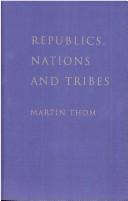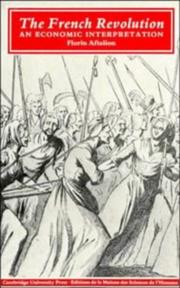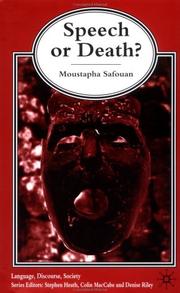| Listing 1 - 10 of 18 | << page >> |
Sort by
|

ISBN: 1859840205 Year: 1995 Publisher: London Verso
Abstract | Keywords | Export | Availability | Bookmark
 Loading...
Loading...Choose an application
- Reference Manager
- EndNote
- RefWorks (Direct export to RefWorks)
Nationalism --- Nationalities, Principle of --- Tribes --- Tribes and tribal system --- Families --- Clans --- Nationality, Principle of --- Principle of nationalities --- Minorities --- Nation-state --- Self-determination, National --- History --- Political philosophy. Social philosophy --- Ethnology. Cultural anthropology --- World history

ISBN: 0521362415 0521368103 1139168118 9781139168113 9780521362412 9780521368100 Year: 1990 Publisher: Cambridge : Cambridge University Press,
Abstract | Keywords | Export | Availability | Bookmark
 Loading...
Loading...Choose an application
- Reference Manager
- EndNote
- RefWorks (Direct export to RefWorks)
The economic history of revolutionary France is still a neglected area in studies of the Revolution of 1789. Whilst some attention has been given to the condition of the peasants, the urban working classes and the financial crisis of the Ancient Régime, there has been a general tendency to regard economic factors as external and somewhat peripheral to the truly political nature of the Revolution. This book is designed to redress the balance, providing a clear, accessible, and thought-provoking guide to the economic background to the French Revolution. Professor Aftalion analyses the policies followed by successive revolutionary assemblies, examining in detail taxation, the confiscation of church property, the assignats, and the siege economy of the Terror. He shows how decisions taken in 1789 by the Constituent Assembly inevitably led to a deepening financial and economic crisis, and to increasingly radical and disastrous policies. The study is important also for its exposure of many of the economic fallacies propounded both at the time by many Frenchmen and later by many modern historians.
History of France --- anno 1700-1799 --- France --- Economic conditions --- History --- Arts and Humanities --- Business & Economics --- Economic History
Book
ISBN: 052138253X Year: 1992 Volume: vol *3 Publisher: Cambridge Cambridge University press
Abstract | Keywords | Export | Availability | Bookmark
 Loading...
Loading...Choose an application
- Reference Manager
- EndNote
- RefWorks (Direct export to RefWorks)
Architecture --- -Engineering --- -Neoclassicism (Architecture) --- -#KVIV:BB --- Construction --- Industrial arts --- Technology --- Architecture, Western (Western countries) --- Building design --- Buildings --- Western architecture (Western countries) --- Art --- Building --- Philosophy --- Design and construction --- France --- Intellectual life --- -Architecture --- Engineering --- Neoclassicism (Architecture) --- Philosophy. --- Pʻŭrangsŭ --- Frankrig --- Francja --- Frant︠s︡ii︠a︡ --- Prantsusmaa --- Francia (Republic) --- Tsarfat --- Tsorfat --- Franḳraykh --- Frankreich --- Fa-kuo --- Faguo --- Франция --- French Republic --- République française --- Peurancih --- Frankryk --- Franse Republiek --- Francland --- Frencisc Cynewīse --- فرنسا --- Faransā --- Franza --- Republica Franzesa --- Gallia (Republic) --- Hyãsia --- Phransiya --- Fransa --- Fransa Respublikası --- Franse --- Францыя --- Frantsyi︠a︡ --- Французская Рэспубліка --- Frantsuzskai︠a︡ Rėspublika --- Parancis --- Pransya --- Franis --- Francuska --- Republika Francuska --- Bro-C'hall --- Френска република --- Frenska republika --- França --- República Francesa --- Pransiya --- Republikang Pranses --- Γαλλία --- Gallia --- Γαλλική Δημοκρατία --- Gallikē Dēmokratia --- فرانسه --- Farānsah --- צרפת --- רפובליקה הצרפתית --- Republiḳah ha-Tsarfatit --- פראנקרייך --- 法国 --- 法蘭西共和國 --- Falanxi Gongheguo --- フランス --- Furansu --- フランス共和国 --- Furansu Kyōwakoku --- Francija --- Ranska --- Frankrike --- #KVIV:BB --- 18th century --- Neoclassicism (Architecture) - France. --- Architecture - Philosophy. --- Engineering - Philosophy. --- France - Intellectual life - 18th century.
Book
ISBN: 9789004223929 9789004252530 9004252533 Year: 2013 Volume: 5 Publisher: Leiden ; Boston : Brill,
Abstract | Keywords | Export | Availability | Bookmark
 Loading...
Loading...Choose an application
- Reference Manager
- EndNote
- RefWorks (Direct export to RefWorks)
The Companion to Medieval Palermo offers a panorama of the history of Medieval Palermo from the sixth to the fifteenth century. Often described by contrast with the communal reality of Medieval Italy as submitted to a royal (external) authority, the city is here given back its density and creativity. Important themes such as artistic and literary productions, religious changes or political autonomy are thus explored anew. Some fields recently investigated are the object of particular scrutiny: the history of the Jews, Byzantine or Islamic Palermo are among them. Contributors are Annliese Nef, Vivien Prigent, Alessandra Bagnera, Mirella Cassarino, Rosi Di Liberto, Elena Pezzini, Henri Bresc, Igor Mineo, Laura Sciascia, Gian Luca Borghese, Sulamith Brodbeck, Benoît Grévin, Giuseppe Mandalà, and Fabrizio Titone.
Cities and towns, Medieval --- Villes médiévales --- Palermo (Italy) --- Palerme (Italie) --- History --- Histoire --- Villes médiévales
Book
ISBN: 0521232368 0521285488 Year: 1982 Publisher: Cambridge Cambridge University Press
Abstract | Keywords | Export | Availability | Bookmark
 Loading...
Loading...Choose an application
- Reference Manager
- EndNote
- RefWorks (Direct export to RefWorks)
Ethnology --- Philosophy.

ISBN: 052124160X 0521616018 0511518315 9780521241601 9780511518317 9780521616010 Year: 1994 Publisher: Cambridge: Cambridge university press,
Abstract | Keywords | Export | Availability | Bookmark
 Loading...
Loading...Choose an application
- Reference Manager
- EndNote
- RefWorks (Direct export to RefWorks)
Music --- Counterpoint. --- Musical meter and rhythm. --- History and criticism. --- Music - Africa, Central - History and criticism.
Book
ISBN: 9780333291207 0333291204 Year: 1983 Publisher: London: MacMillan,
Abstract | Keywords | Export | Availability | Bookmark
 Loading...
Loading...Choose an application
- Reference Manager
- EndNote
- RefWorks (Direct export to RefWorks)
Book
ISBN: 9780231539241 023153924X 9780231169233 9780231169226 Year: 2015 Publisher: New York
Abstract | Keywords | Export | Availability | Bookmark
 Loading...
Loading...Choose an application
- Reference Manager
- EndNote
- RefWorks (Direct export to RefWorks)

ISBN: 0333668693 Year: 2003 Publisher: Basingstoke Palgrave Macmillan
Abstract | Keywords | Export | Availability | Bookmark
 Loading...
Loading...Choose an application
- Reference Manager
- EndNote
- RefWorks (Direct export to RefWorks)
Social sciences and psychoanalysis --- Social sciences --- Philosophy
Book
Year: 2015 Publisher: New York, NY : Columbia University Press,
Abstract | Keywords | Export | Availability | Bookmark
 Loading...
Loading...Choose an application
- Reference Manager
- EndNote
- RefWorks (Direct export to RefWorks)
Human Kindness and the Smell of Warm Croissants makes philosophy fun, tactile, and popular. Moral thinking is simple, Ruwen Ogien argues, and as inherent as the senses. In our daily experiences, in the situations we confront and in the scenes we witness, we develop an understanding of right and wrong as sophisticated as the moral outlook of the world's most gifted philosophers. By drawing on this knowledge to navigate life's most perplexing problems, ethics becomes second nature.Ogien explores, through experimental philosophy and other methods, the responses nineteen real-world conundrums provoke. Is a short, mediocre life better than no life at all? Is it acceptable to kill a healthy person so his organs can save five others? Would you swap a "natural" life filled with frustration, disappointment, and partial success for a world in which all of your needs are met, but through artificial and mechanical means? Ogien doesn't seek to show how difficult it is to determine right from wrong or how easy it is for humans to become monsters or react like saints. Helping us tap into the wisdom and feeling we already possess in our ethical "toolboxes," Ogien instead encourages readers to question moral presuppositions and rules; embrace an intuitive sense of dignity, virtue, and justice; and pursue a pluralist ethics suited to the principles of human kindness.
| Listing 1 - 10 of 18 | << page >> |
Sort by
|

 Search
Search Feedback
Feedback About UniCat
About UniCat  Help
Help News
News